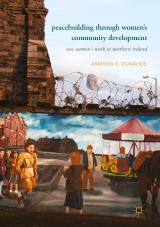Details

Peacebuilding through Women's Community Development
Wee Women's Work in Northern Ireland|
96,29 € |
|
| Verlag: | Palgrave Macmillan |
| Format: | |
| Veröffentl.: | 22.06.2017 |
| ISBN/EAN: | 9783319551944 |
| Sprache: | englisch |
Dieses eBook enthält ein Wasserzeichen.
Beschreibungen
This book explores the gendered history of the Troubles, the rise of the Northern Ireland Women’s Coalition, and the role of community development as a new field in Northern Ireland. Nearly twenty years after the Belfast or Good Friday Agreement that ended the Troubles in Northern Ireland, tensions persist and society is still deeply divided. The book addresses the ways in which women navigate these tensions and contribute to peacebuilding through community development, described dismissively by many in Northern Ireland as the work of “wee women.” Women navigate this gendered space to build peace strategically through “Wee Women’s Work.” The author focuses in particular on the Women’s Sector and draws on feminist theory to examine the distinction between formal and informal politics.
1. Introduction.- 2. Benign Apartheid.- 3. The Gendered Politics of Violence.- 4. The Coalition and the Peace Process.- 5. The Development of Community Development.- 6. Wee Women’s Work.- 7. Politics and Constraint.- 8. Looking Outward.- 9. Conclusion.
<b>Amanda E. Donahoe</b> is Lecturer of Peace and Justice Studies at Tufts University, USA. She teaches on issues of political identity, political violence, peace, and conflict resolution.
This book explores the gendered history of the Troubles, the rise of the Northern Ireland Women’s Coalition, and the role of community development as a new field in Northern Ireland. Nearly twenty years after the Belfast or Good Friday Agreement that ended the Troubles in Northern Ireland, tensions persist and society is still deeply divided. The book addresses the ways in which women navigate these tensions and contribute to peacebuilding through community development, described dismissively by many in Northern Ireland as the work of “wee women.” Women navigate this gendered space to build peace strategically through “Wee Women’s Work.” The author focuses in particular on the Women’s Sector and draws on feminist theory to examine the distinction between formal and informal politics.
Offers a reflective look at an ongoing post-conflict situation Explores women's participation in peacebuilding Deepens readers' comprehension of how the Troubles in Northern Ireland originated and were gendered
“This is a beautifully written book, and unique in its scope. It takes you intimately into the lives and concerns of the many thousands of women working to effect social change within their communities and across the sectarian divides in Northern Ireland. It captures their warmth and their hopes, their cynicisms and their courage, and above all their indomitable spirit in forging lives for themselves and their communities in the midst of on-going sectarian tensions, and frequent violence. Written with sensitivity and skill, it captures their everyday struggles and triumphs and paints a rare picture of what it takes as women working together to survive and even thrive in a context where societal divisions seem implacable, and sustainable peace as yet a fragile goal.” (Mari Fitzduff, Professor, Brandeis University, USA)<p></p><div><p>“This well-researched book maps the challenges of negotiating everyday life in the North ofIreland, after the signing of the Belfast Agreement. Drawing on the brilliant insights of key figures, leading women’s peacebuilding initiatives at the grassroots level, Donahoe examines the ongoing efforts of women on both sides of the political divide to engage in conflict transformation. Instead of idealizing women as peacemakers and bridge-builders across political divides, the book documents the fragility of such efforts and the creativity and perseverance required to nurture cross-community alliances in the aftermath of political violence. The interdisciplinary scope of the book makes it an invaluable resource to scholars, policymakers, and activists with interest in the interplay between gender and politics in post-conflict societies.” (Simona Sharoni, Professor, State University of New York, Plattsburgh, USA)</p></div>
Diese Produkte könnten Sie auch interessieren:

How Insights from Moral Psychology and Character Research can aid Development Cooperation

von: Jan Prothmann

13,99 €
















